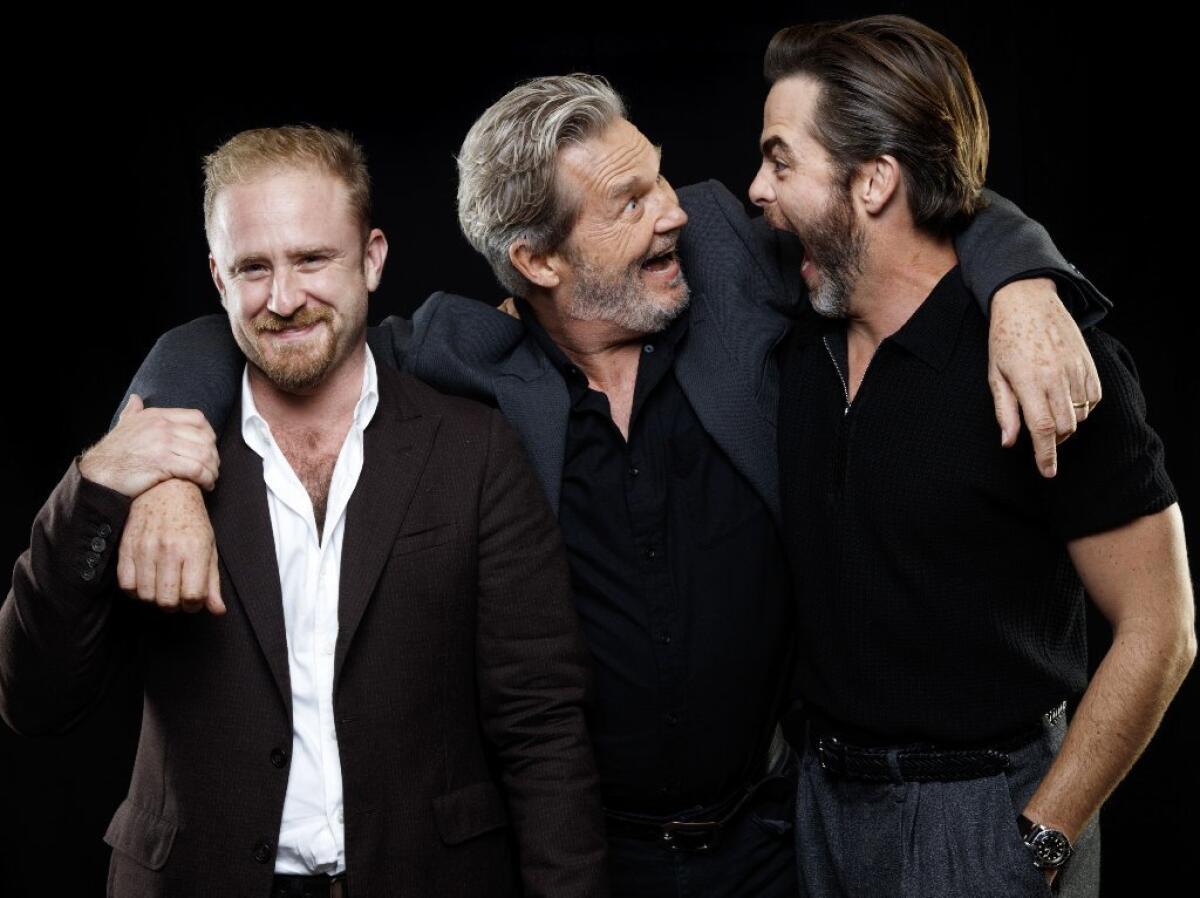‘Hell or High Water’ shows the bigotry, violence, poverty and quiet love in the world, cast says

- Share via
Chris Pine, Ben Foster and Jeff Bridges are sitting at a table three days before election day and no one in the room realizes how much more relevant their already timely film, “Hell or High Water,” is about to become.
“I think it really shines a light on the separation of the 1% from the 99,” Pine says. “It showed me how privileged I am. These financial problems that these people deal with, I haven’t because I am so unbelievably fortunate and it was troublesome in a way to think that, ‘my God that’s how separated we are from one another.’ That is what’s happening in our country right now.”

Ben Foster, Chris Pine and Jeff Bridges star in “Hell or High Water.”
In “Hell,” director David Mackenzie and screenwriter Taylor Sheridan have crafted a modern-day western where two brothers, Toby and Tanner Howard (Pine and Foster, respectively), find themselves with no other option than to rob branches of a bank that’s about to foreclose on the family ranch. Texas Ranger Marcus Hamilton (Bridges), a complicated man who teases his American Indian colleague Alberto (Gil Birmingham) incessantly, tracks them down in what will be his last official case before his retirement.
Sheridan knows these corners of West Texas well and sprinkles each small town with residents who can barely get by and whose racism and/or xenophobia are textbook examples of those who feel they were left behind by the latest economic recovery.
“It so speaks to how banks have screwed over communities and people for years,” Pine says. “It so speaks to generational violence and family trauma. It speaks to gun violence. All of these things kind of completely went over my head and I actually learned an incredible amount about how resonant the film was and all of these issues.”
Bridges too understands the film’s contemporary themes but also saw it as a timeless piece of art, noting, “that’s how we roll as humans, that’s our species — very selfish, just thinking about ourselves and there’s some beauty to that. What we’re willing to do for our family, yeah, but at your family’s expense. But there’s still love involved, tremendous love involved.
“Look at Standing Rock, man, what’s going on right now,” he adds of the protests over the Dakota Access pipeline. “This is a perfect example, but that kind of stuff [has been going on] forever hasn’t it? I think the success of the script, and why people say ‘that’s a great movie’ is because it reminds us of who we are and shines a little light on what we’re capable of, you know?”
Foster appreciated that the Scottish Mackenzie didn’t “hammer us over the head with the politics of it.” That, in fact, the film very much is a tribute to the socially conscious films of the ’70s. He notes, “We were influenced by the Peckinpahs of the world. There is a quality of stoicism and male love gone poorly communicated that ornaments these deeper themes that Taylor set up very, very intelligently.”
It’s also hard to ignore the casual racism Marcus administers to Alberto throughout their manhunt. Bridges doesn’t see his character as racist but just a victim of his own upbringing and that his teasing of his partner is how he expresses his fondness for him. Bridges adds, “I come from a family of teasers. My grandfather was from Liverpool [he would] tease the … out of us and my mother would tell us, ‘That’s because he loves you.’”
During one particular scene, however, Marcus and Alberto are sharing a motel room on the road and while the latter is over the constant putdowns and wants to say goodnight, the former doesn’t want the day or his career to end.
It’s a moment that particularly struck Foster. He tells Bridges, “What breaks my heart every time I see that scene is how bad you don’t want to go to bed.”
“Yeah, let’s talk … ,” Bridges says of his character’s thought process.
“We have a binding clause of friendship of saying, ‘It’s safe here to call each other names whatever they are,’” Foster says. “Make fun of each other but that’s our way of playing.”
“‘Come on, give me a massage,’” Bridges quotes his character, laughing.
“It’s too much at a certain point, it is inappropriate and he wants to go to bed,” Foster says. “The way that Gil handled that moment saying, ‘I’m not taking this … and I do want to go to bed because it’s not fun anymore.’”
Bridges adds, “How all of that stuff can exist all at the same time. Can have all that hate and fear and dishonesty and all types of things going on and this love that’s making it all flow.”
“Your character recognizes that, puts on his hat off center, grabs his six pack and goes out into the night because it no longer works,” Foster says. “That’s the point. This film is about a world that no longer can survive in the way that it’s been. It has to move forward. The world has already moved past us. We’re those that have been left behind. That’s where the bigotry comes in, that’s where the racism comes in, that’s where the lack of love articulated comes in and that’s what Taylor wrote.”
See the most read stories this hour »
More to Read
From the Oscars to the Emmys.
Get the Envelope newsletter for exclusive awards season coverage, behind-the-scenes stories from the Envelope podcast and columnist Glenn Whipp’s must-read analysis.
You may occasionally receive promotional content from the Los Angeles Times.










